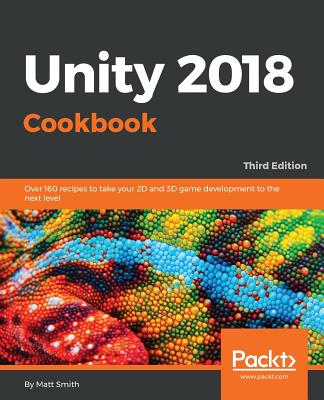

 Packt Publishing
Packt Publishing
Unity 2018 Cookbook: Over 160 recipes to take your 2D and 3D game development to the next level


Key Metrics
- Matthew Smith
- Packt Publishing
- Paperback
- 9781788471909
- 9.25 X 7.5 X 1.58 inches
- 2.95 pounds
- Computers > Programming - Games
- English
 Secure Transaction
Secure TransactionBook Description
Develop quality game components and solve common gameplay problems with various game design patterns
Key Features
- Become proficient at traditional 2D and 3D game development
- Build amazing interactive interfaces with Unity's UI system
- Develop professional games with realistic animation and graphics, materials and cameras, and AI with Unity 2018
Book Description
With the help of the Unity 2018 Cookbook, you'll discover how to make the most of the UI system and understand how to animate both 2D and 3D characters and game scene objects using Unity's Mecanim animation toolsets.
Once you've got to grips with the basics, you will familiarize yourself with shaders and Shader Graphs, followed by understanding the animation features to enhance your skills in building fantastic games. In addition to this, you will discover AI and navigation techniques for nonplayer character control and later explore Unity 2018's newly added features to improve your 2D and 3D game development skills. This book provides many Unity C# gameplay scripting techniques.
By the end of this book, you'll have gained comprehensive knowledge in game development with Unity 2018.
What you will learn
- Get creative with Unity's shaders and learn to build your own shaders with the new Shader Graph tool
- Create a text and image character dialog with the free Fungus Unity plugin
- Explore new features integrated into Unity 2018, including TextMesh Pro and ProBuilder
- Master Unity audio, including ducking, reverbing, and matching pitch to animation speeds
- Work with the new Cinemachine and timeline to intelligently control camera movements
- Improve ambiance through the use of lights and effects, including reflection and light probes
- Create stylish user interfaces with the UI system, including power bars and clock displays
Author Bio
I joined the University of Strathclyde and the Centre for the Social History of Health and Healthcare (CSHHH) in 2011, after completing a PhD and post-doctoral work at the University of Exeter's Centre for Medical History. My research and teaching have focussed on three primary areas within the history of health and medicine: mental health and psychiatry; allergy and immunology; and food and nutrition.
Thanks to generous funding from the Wellcome Trust, this research has contributed to one edited volume: Proteins, Pathologies and Politics: Dietary Innovation and Disease from the Nineteenth Century (Bloomsbury, 2018, co-edited by David Gentilcore); and three monographs: An Alternative History of Hyperactivity: Food Additives and the Feingold Diet (Rutgers University Press, 2011); Hyperactive: The Controversial History of ADHD (Reaktion, 2012); and Another Person's Poison: A History of Food Allergy (Columbia University Press, 2015), which was reviewed in the New York Times and given honourable mention in the Association of American Publishers' Prose Awards for 2016.
I am currently working on a monograph project on the history of social psychiatry in the United States. Funded by an AHRC Early Career Fellowship, this project investigates how American psychiatrists and social scientists viewed the connection between mental illness and social deprivation during the decades that followed the Second World War. This funding has resulted in a special issue of Palgrave Communications (co-edited with Lucas Richert) and two edited volumes, Deinstitutionalisation and After: Post-War Psychiatry in the Western World (2016) and Preventing Mental Illness: Past, Present and Future (2018), both co-edited by Despo Kritsotaki and Vicky Long, and published in the Palgrave series I co-edit with Catharine Coleborne: Mental Health in Historical Perspective.
My social psychiatry project has spurred an interest in Universal Basic Income (UBI) as a preventive mental health policy. I am currently co-leading (with Mike Danton) a Scottish Universities Insight Initiative project called Peace of Mind: Exploring Universal Basic Income's Potential to Improve Mental Health.
In future, I would like to research the history of hydrotherapy in psychiatric practice.
I believe strongly that historical research can have a significant impact on public policy and decision making. As such, I have tried to engage with the public as much as I can through broadcasting, public lecturing, blogging and speaking to health and education professionals. My efforts in these areas were enhanced in 2012 when I was named an AHRC/BBC New Generation Thinker. I have written for medical publications, such as The Lancet and the Canadian Medical Association Journal (CMAJ), presented my research to the New York City Department of Health and Mental Hygiene and work closely with a range of medical and educational professionals. Recently, my book Hyperactive was used by novelist William Sutcliffe as inspiration and research for his novel Concentr8 (Bloomsbury, 2015).
I previously served as Vice-Dean of Research for the Faculty of Humanities and Social Sciences (HaSS), following stints as Co-Director of the Centre for the Social History of Health and Healthcare, the Director of Research for History and Deputy Head of the School of Humanities. I have also served on the Executive Committee of the Society for the Social History of Medicine and the Royal Society of Edinburgh's Young Academy of Scotland. I am a Fellow of the RSA and the Royal Historical Society.
Source: The University of Strathclyde
Videos


Community reviews
Write a ReviewNo Community reviews